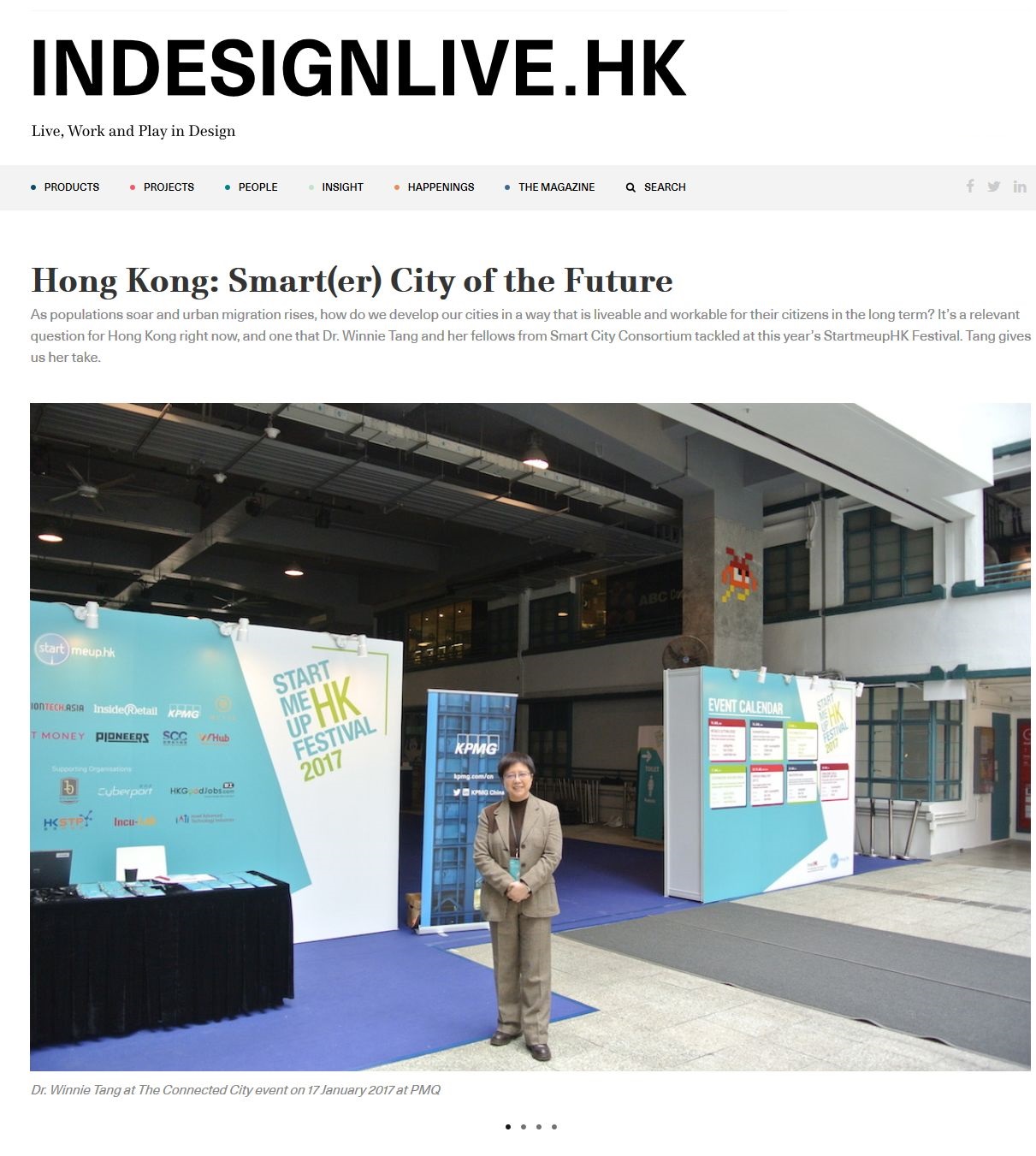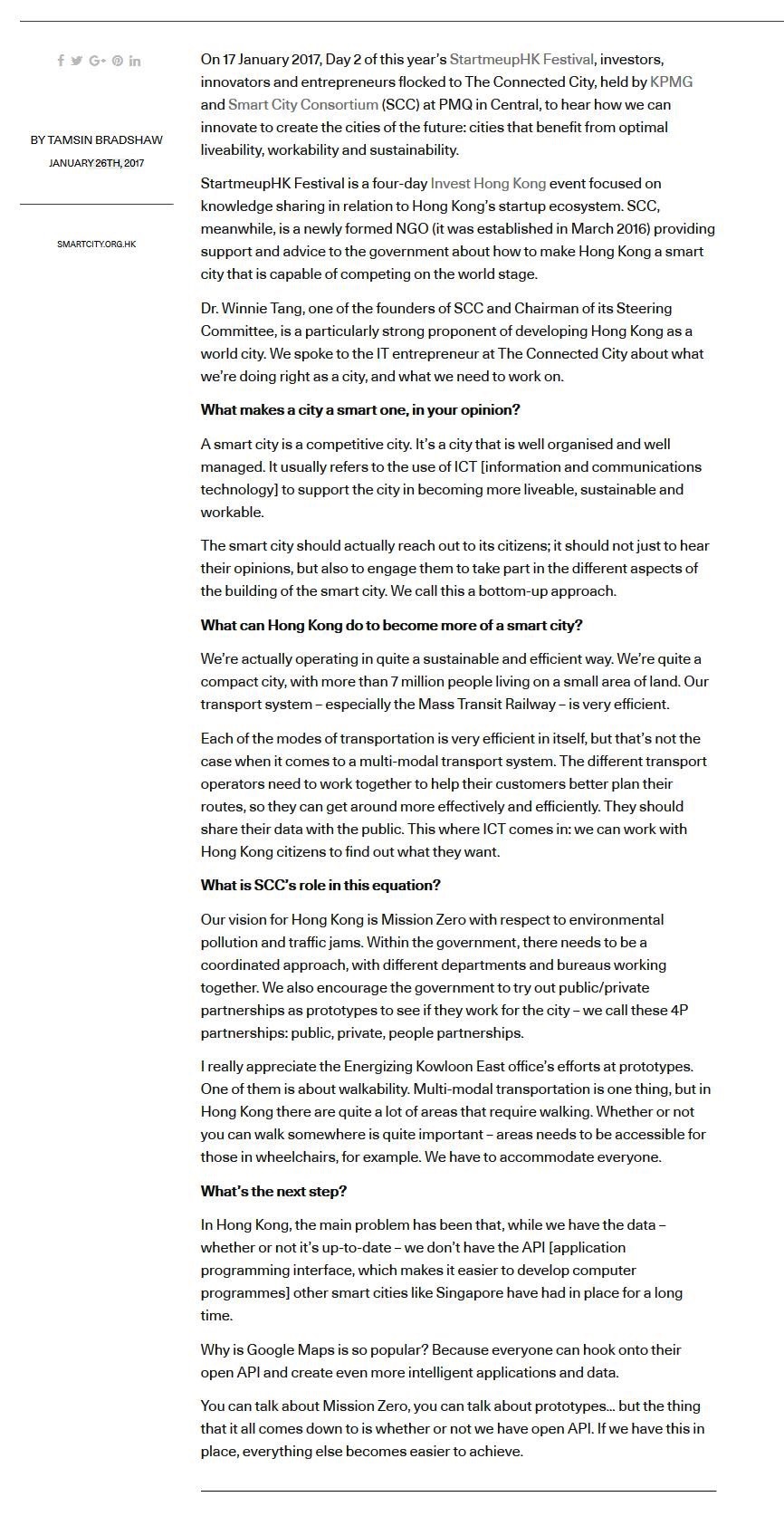網上版請按此


Hong Kong: Smart(er) City of the Future
As populations soar and urban migration rises, how do we develop our cities in a way that is liveable and workable for their citizens in the long term? It's a relevant question for Hong Kong right now, and one that Dr. Winnie Tang and her fellows from Smart City Consortium tackled at this year's StartmeupHK Festival. Tang gives us her take.
On 17 January 2017, Day 2 of this year's StartmeupHK Festival, investors, innovators and entrepreneurs flocked to The Connected City, held by KPMG and Smart City Consortium (SCC) at PMQ in Central, to hear how we can innovate to create the cities of the future: cities that benefit from optimal liveability, workability and sustainability.
StartmeupHK Festival is a four-day Invest Hong Kong event focused on knowledge sharing in relation to Hong Kong's startup ecosystem. SCC, meanwhile, is a newly formed NGO (it was established in March 2016) providing support and advice to the government about how to make Hong Kong a smart city that is capable of competing on the world stage.
Dr. Winnie Tang, one of the founders of SCC and Chairman of its Steering Committee, is a particularly strong proponent of developing Hong Kong as a world city. We spoke to the IT entrepreneur at The Connected City about what we're doing right as a city, and what we need to work on.
What makes a city a smart one, in your opinion?
A smart city is a competitive city. It's a city that is well organised and well managed. It usually refers to the use of ICT [information and communications technology] to support the city in becoming more liveable, sustainable and workable.
The smart city should actually reach out to its citizens; it should not just to hear their opinions, but also to engage them to take part in the different aspects of the building of the smart city. We call this a bottom-up approach.
What can Hong Kong do to become more of a smart city?
We're actually operating in quite a sustainable and efficient way. We're quite a compact city, with more than 7 million people living on a small area of land. Our transport system – especially the Mass Transit Railway – is very efficient.
Each of the modes of transportation is very efficient in itself, but that's not the case when it comes to a multi-modal transport system. The different transport operators need to work together to help their customers better plan their routes, so they can get around more effectively and efficiently. They should share their data with the public. This where ICT comes in: we can work with Hong Kong citizens to find out what they want.
What is SCC's role in this equation?
Our vision for Hong Kong is Mission Zero with respect to environmental pollution and traffic jams. Within the government, there needs to be a coordinated approach, with different departments and bureaus working together. We also encourage the government to try out public/private partnerships as prototypes to see if they work for the city – we call these 4P partnerships: public, private, people partnerships.
I really appreciate the Energizing Kowloon East office's efforts at prototypes. One of them is about walkability. Multi-modal transportation is one thing, but in Hong Kong there are quite a lot of areas that require walking. Whether or not you can walk somewhere is quite important – areas needs to be accessible for those in wheelchairs, for example. We have to accommodate everyone.
What's the next step?
In Hong Kong, the main problem has been that, while we have the data – whether or not it's up-to-date – we don't have the API [application programming interface, which makes it easier to develop computer programmes] other smart cities like Singapore have had in place for a long time.
Why is Google Maps is so popular? Because everyone can hook onto their open API and create even more intelligent applications and data.
You can talk about Mission Zero, you can talk about prototypes... but the thing that it all comes down to is whether or not we have open API. If we have this in place, everything else becomes easier to achieve.